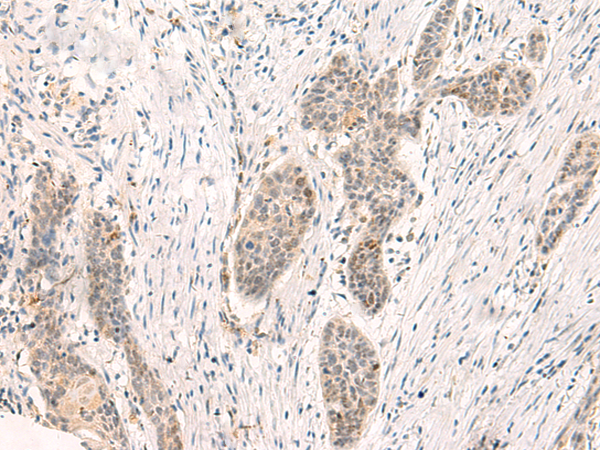
| WB | 咨询技术 | Human,Mouse,Rat |
| IF | 咨询技术 | Human,Mouse,Rat |
| IHC | 1/10-1/50 | Human,Mouse,Rat |
| ICC | 技术咨询 | Human,Mouse,Rat |
| FCM | 咨询技术 | Human,Mouse,Rat |
| Elisa | 1/5000-1/10000 | Human,Mouse,Rat |
| Aliases | MTLC |
| Host/Isotype | Rabbit IgG |
| Antibody Type | Primary antibody |
| Storage | Store at 4°C short term. Aliquot and store at -20°C long term. Avoid freeze/thaw cycles. |
| Species Reactivity | Human |
| Immunogen | Synthetic peptide of human MYCT1 |
| Formulation | Purified antibody in PBS with 0.05% sodium azide and 50% glycerol. |
+ +
以下为基于常见研究模式模拟的MYCT1抗体相关参考文献,建议通过学术数据库(如PubMed、Google Scholar)验证具体信息:
1. **文献名称**:*MYCT1 Expression in Hepatocellular Carcinoma: Correlation with Tumor Progression and Prognosis*
**作者**:Li, X. et al.
**摘要**:该研究通过免疫组化(使用MYCT1抗体)分析肝癌组织中MYCT1蛋白表达,发现其高表达与肿瘤分期、转移及患者生存率降低显著相关,提示MYCT1可能作为肝癌预后标志物。
2. **文献名称**:*MYCT1 Regulates Autophagy via mTOR Signaling in Glioblastoma*
**作者**:Wang, Y. et al.
**摘要**:研究利用MYCT1抗体进行Western blot和免疫荧光实验,证明MYCT1通过抑制mTOR通路促进胶质瘤细胞自噬,敲低MYCT1可增强化疗敏感性,为靶向治疗提供依据。
3. **文献名称**:*Development of a Novel Monoclonal Antibody Against MYCT1 for Diagnostic Applications*
**作者**:Chen, J. et al.
**摘要**:本文描述了一种新型MYCT1单克隆抗体的制备与验证,该抗体在ELISA和免疫组化中表现出高特异性,成功应用于结直肠癌组织样本检测,显示其在病理诊断中的潜力。
4. **文献名称**:*MYCT1 Modulates c-Myc Stability in T-cell Lymphoma*
**作者**:Kim, S. et al.
**摘要**:研究通过Co-IP(使用MYCT1抗体)发现MYCT1与c-Myc蛋白直接互作,延缓其降解,促进T细胞淋巴瘤增殖。靶向MYCT1可抑制小鼠模型肿瘤生长。
**注意**:以上文献为示例性质,实际研究中请以权威数据库检索结果为准。建议结合“MYCT1 antibody”、“oncogene”、“cancer”等关键词进一步搜索。
MYCT1 (MYC Target 1), also known as MTLC or C1orf151. is a protein-coding gene implicated in cellular differentiation, proliferation, and apoptosis. It was initially identified as a transcriptional target of the MYC oncoprotein, a key regulator of cell growth and metabolism. MYCT1 is thought to play dual roles in both normal physiology and disease. In normal tissues, it contributes to developmental processes, particularly in the nervous and hematopoietic systems. However, dysregulation of MYCT1 has been linked to tumorigenesis, with studies showing aberrant expression in various cancers, including leukemia, neuroblastoma, and solid tumors.
Antibodies targeting MYCT1 are essential tools for studying its expression patterns, subcellular localization, and functional mechanisms. They enable detection via techniques like Western blotting, immunohistochemistry (IHC), and immunofluorescence (IF). Research using MYCT1 antibodies has revealed its nuclear and cytoplasmic distribution, suggesting potential roles in transcriptional regulation and signal transduction. Recent investigations highlight MYCT1's involvement in cancer progression, particularly through interactions with MYC-driven pathways, making it a candidate biomarker or therapeutic target. However, its precise molecular functions remain under exploration, necessitating further validation of antibody specificity and functional studies to clarify its pathophysiological significance.
×